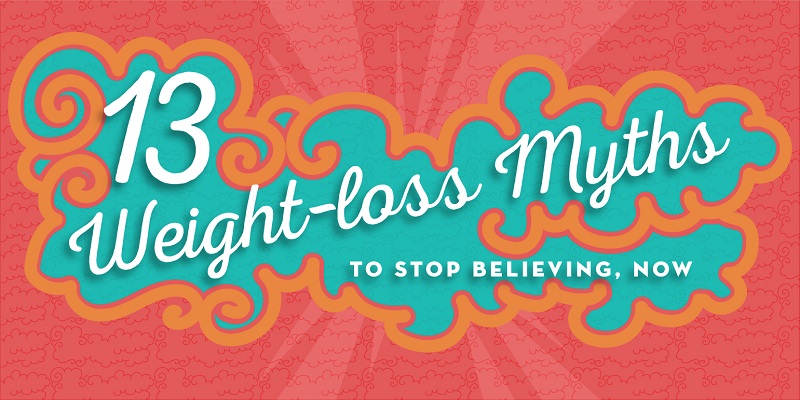Weight loss myths abound. If you google “weight-loss tips”, you’ll get around 38 million results. Let’s point out some of those that are definitely myths.

How many times have you heard someone say something like, “I want to lose weight, so I’m going to start taking these fat-burning pills!”
Or, “I want to lose weight, so I’m going to cut carbs completely out of my diet!”
While it’s tempting to think that there’s a quick fix or a one-size-fits-all solution, there’s so much (mis)information out there that it’s difficult to know what works — and what’s a waste of your precious time and money.
Weight Loss Myths
Read on to find out what weight loss myths you need to avoid.
1. Myth: You Have to Cut Out Certain Foods to Lose Weight
Fact: Studies show that low-carbohydrate eating plans like the trendy ketogenic diet can help people lose weight in the short-term, but there’s no strong evidence of the long-term effectiveness or practicality of low-carb eating for weight loss.
“If you abruptly cut out carbohydrates (or any source of calories) from your diet, thereby reducing your total calorie intake, you very well may lose weight in the short-term,” says Andy De Santis, R.D., a dietitian based in Toronto, Canada.
“This has nothing to do with the carbohydrates themselves. In fact, it’s quite likely the sources of carbohydrates that people are cutting out are items like chips and baked goods, which actually contribute more calories from fat than from carbohydrates,” he explains.
Another trendy choice: gluten-free diets. While people with celiac disease and gluten intolerances have reason to avoid foods with gluten, there’s no evidence that doing so is helpful for those who don’t.
“People who follow a gluten-free diet for weight-loss purposes may start eating the variety of gluten-free products lining supermarket shelves, which are often full of more sugar and fat to help mimic the flavor and texture of products containing gluten and can even have more calories,” says Amer.
To lose weight — and keep it off — it’s important to eat meals that have a healthy balance of carbs (40 percent), protein (30 percent), and fat (30 percent) in the proper amounts. If counting calories isn’t your thing, then using portion containers can take the guesswork (and math) out of the process.
2. Myth: Juicing and Detoxes Are Good Ways to Lose Weight
Fact: You might lose weight going on an all-juice detox, but you’ll quickly gain it back when you start eating again — and you’ll be missing out on important nutrients like protein, fat, and fiber.
“Another weight loss myth is that juice contains all of the nutrients you need to thrive,” says Chelsey Amer, M.S., R.D.N., a dietitian based in New York City. “Vegetable and fruit juices have the fiber stripped out and instead contain just sugar, vitamins, and minerals. I would much rather you eat fruits and vegetables in their whole form because they contain fiber, which helps keep you full and because we are more satisfied when we chew real food.”
A cleanse, however, like 3-Day Refresh or Ultimate Reset, focuses on filling, nutrient-rich foods that help you jump-start a healthy eating plan. Losing weight is a nice bonus when you’re on a cleanse, but it’s not the ultimate goal; it’s the final result — establishing healthy eating habits — that will lead to lasting weight loss.
3. Myth: Losing Weight Is an “All or Nothing” Game
Fact: It’s tempting to try to change everything all at once when we think about where we ideally want to be. But you don’t have to do everything at the same time or even make radical changes.
“Don’t become wrapped up in the ‘right’ and ‘wrong’ things you have been told about health,” says Lori D’Alessandro, a certified personal trainer based in Fairfax, Virginia.
Instead, she advises adopting a few easy things — like upping your daily activity and recording your daily food intake, to start. Eventually, those small changes will add up to bigger results — and long-term weight loss that’s sustainable.
In a behavioral study by Cornell University’s Food and Brand Lab, researchers found that people who lost the most weight were those who made small, consistent changes to the way they ate.
4. Myth: The Number on the Scale Is the Ultimate Goal
Fact: Weight loss is not a linear process. You might even find that you’re gaining weight after starting a workout program, so the number on the scale isn’t necessarily an accurate reflection of the hard work that you’re doing.
When you work out, you’re making small “tears” in your muscle fibers; as your body repairs and rebuilds those tears, it retains fluid (temporarily) as part of the process, so what you see on the scale is most likely water weight.
A plateau can also mess with the number on your scale. These plateaus usually mean that you’re not paying close enough attention to your nutrition, your workout plan isn’t challenging you anymore, or you’re not adhering to the plan like you should. Figure out the source of the problem and you’ll be back on the weight-loss train.
Your weight can fluctuate from hour to hour, based on how much fluid, food, and sodium you’re taking in during the day. A scale can’t tell you the difference between actual weight (fat, muscle, etc.) and temporary weight (food and drink).
“Your weight can vary up or down by as many as 15 pounds based on your level of hydration and salt intake,” says Robert Huizenga, M.D., an internist and Associate Professor of Clinical Medicine at UCLA.
That said, don’t toss your bathroom scale out the window. A 2-year study conducted by Cornell University shows that frequent weigh-ins can help you stay on track by keeping you aware of your progress and reinforcing your positive choices. So, go ahead and weigh yourself, but just know that the number you see isn’t the “final word” on how you’re doing.
5. Myth: All Calories Are Equal
Fact: Your body processes calories differently depending on the food source, so all calories are not equal. That is a weight loss myth. It’s not enough to hit your daily calorie count; you need to make sure you’re eating quality calories.
“Different foods go through different metabolic pathways and have vastly different effects on hunger, metabolism, and the hormones that regulate body weight,” says Meghan Kennihan, a NASM-certified personal trainer. “For example, swapping [simple] carbohydrates with protein can boost metabolism, reduce appetite and cravings, and optimize the function of some weight-related hormones.”
But you won’t turn into a calorie-burning machine just by packing your diet with protein. By adding more protein and weight training to your overall fitness plan, you’ll be building muscle mass, which in turn will elevate your metabolism.
So, let’s say your daily calorie target is in the 1,200–1,500 range. If you’re hitting that target, but with foods full of refined sugars, flour, and fat, it’s probably not going to be as effective as an eating plan in the same calorie range packed with high-quality, nutrient-dense foods in the proper proportions. Think quantity and quality.
6. Myth: The More Calories You Cut, The Faster You’ll Lose Weight
Fact: Eat too many calories, and over time, your body will convert that excess energy to fat. Eat fewer calories and your body will lose fat. But eat too few for a longer period of time and your weight-loss progress will hit the brakes.
This seems counterintuitive, but long-term under-eating may cause your hormones to freak out: They tell your body to eat more food and slow your metabolism to conserve fat since it doesn’t know when you’ll stop under-eating.
Instead of always limiting calories, find a day or two of the week to eat more to help your hormones get back in line.
7. Myth: Eating After a Certain Time Will Make You Gain Weight
Fact: Studies show this may have some truth, but it’s not as cut-and-dried as some people claim. A couple of recent studies — one only tested on lab mice and the other on a very small group of people — found that nighttime eating could lead to fat gain.
That doesn’t mean you should starve yourself if you work out at night or haven’t had time to eat all day — just don’t go gorging on a high-calorie, high-fat meal.
A light snack of protein and complex carbs or Beachbody Performance Recharge can help your body jump-start recovery after a late-night workout. It will also help you feel satisfied so you don’t wake up to a growling stomach in the middle of the night.
8. Myth: Cardio Is the Best Exercise for Weight Loss
Fact: Steady-state cardio isn’t the most effective strategy for sustained weight loss. You may see pounds drop off initially, but over time (and relatively quickly) your progress will likely stall.
The reason is twofold: First, it’s highly repetitive (think: running the same route at the same pace every time), so your body adapts to it quickly. As adaptation slows, so too will weight loss, resulting in a plateau.
Second, it’s low-intensity and it targets your slow-twitch muscle fibers. To kick your weight loss into high gear, you have to target your fast-twitch fibers — which are larger and have more growth potential — with activities like weightlifting or (even better) high-intensity interval training (HIIT).
HIIT not only burns tons of calories while you work out, but it also ramps up your metabolism for up to 72 hours afterward as you body repairs the (very normal and natural) microtrauma caused by your workout and adds muscle tissue so you can better handle your next workout.
Bottom line: Muscle repair and growth requires a sustained increase in energy expenditure, and those processes are triggered to a greater degree with high-intensity workouts (like HIIT and weightlifting) than low-intensity ones (like running).
9. Myth: You Can Spot Reduce to Lose Weight in Certain Areas (Like Your Belly)
Fact: Nope! This is definitely one myth that needs to die. Repeat after us: You cannot spot reduce.
“It’s not possible to burn fat at a specific area,” says Behrendt. The only surefire way to reduce fat in one area of your body is to lower your overall body fat with a balanced diet and exercise program.
If you want to reveal your rock-hard guns and sculpted abs to the world, you’ll have to drop the fat that’s covering them up. Try adding more protein, fiber, and healthy fats to your diet and ditch the simple carbs and liquor.
10. Myth: You Just Need to Have Willpower to Lose Weight
Fact: The idea that weight-loss success hinges solely on willpower (i.e., the ability to resist unhealthy impulses, like eating too many cookies, or not exercising because you’re just not in the mood) is flawed. Research shows that relying on willpower alone to lose weight only works in the short-term.
There are many factors that influence weight, including hormones, stress, and genetics. Weight gain and loss is complex, so don’t beat yourself up over a “lack” of willpower — or over biological and environmental factors you can’t necessarily control.
Instead of thinking of willpower as a superpower, and worrying about whether you have it or not, do as much as you can to make it a nonissue. Keep healthy snacks on the kitchen counter where they’ll be more easily accessible than, say, the cookies in the cupboard.
Place your running shoes next to your bed to make slipping into them convenient — and to give yourself one less excuse to stay under the covers when your alarm goes off.
Ditch that gym membership you never use and join Beachbody On Demand, where you can stream hundreds of workouts at home.
In short, have game plans to avoid temptations and triumph in circumstances that typically challenge your self-control.
11. Myth: The Sugar in Fruit Will Make You Gain Weight
Fact: While eating too much of anything, even healthy foods, can thwart your weight-loss efforts, eating a few pieces of fruit each day as part of a healthy, balanced diet will not cause weight gain, Amer says.
“Fruit does contain natural sugar, but it also contains fiber, vitamins, and minerals that are excellent for your health, so please do not completely eliminate fruit from your diet,” she advises. The fiber in fruit will also slow the absorption of the sugars.
What you really need to watch out for is sneaky sugars in foods like salad dressings, pasta sauce, granola, and ketchup.
12. Myth: Breakfast Is the Most Important Meal of the Day
Fact: Eating breakfast isn’t a guaranteed weight-loss tool. After all, if you’re rolling out of bed and eating a fat stack of pancakes covered in syrup with a side of bacon and a muffin covered in butter, the only thing you’ll be guaranteed is weight gain.
A 2014 study even found that there was no notable effect on weight loss in subjects who ate breakfast versus subjects who skipped breakfast. But the subjects weren’t told what to eat, so if you’re eating a breakfast that’s heavy on sugar or comes from a package, then no, it’s not going to help you lose weight.
That said, breakfast can be an important part of your weight-loss strategy — if you do it right. The key is that your breakfast lives up to the “most important meal of the day” title: Make sure it’s a healthy, balanced meal with a mix of protein, carbs, and fat.
Eating breakfast can also set the tone for the day and help you establish healthy eating habits, which will give you an edge in the long run for losing weight and keeping it off.
13. Myth: Diet Foods and Drinks Can Help You Lose Weight
Fact: Foods labeled as “low-fat” or “diet” or “gluten-free” can actually make people gain weight.
The reason? People see “sugar-free” or “diet” and think, “Hey, there’s no X in this so I can eat the whole bag/drink the whole jug!” Plus, once something is removed from a processed food, other not-so-great-for you ingredients are added in to replace them to make them palatable.
You’re better off sticking with whole foods and staying away from processed “diet” foods that have a long list of unpronounceable additives.
The Bottom Line
There’s a lot of conflicting noise out there about diets and weight loss, and it’s tempting to latch on to the latest trend in the hopes that it will be the new “magic bullet.”
But your best bet is to stick with what has proven results: Getting your nutrition and exercise on track, getting enough sleep, and staying on top of the latest science-backed information about nutrition and fitness.
From the Beachbody On Demand Blog –








